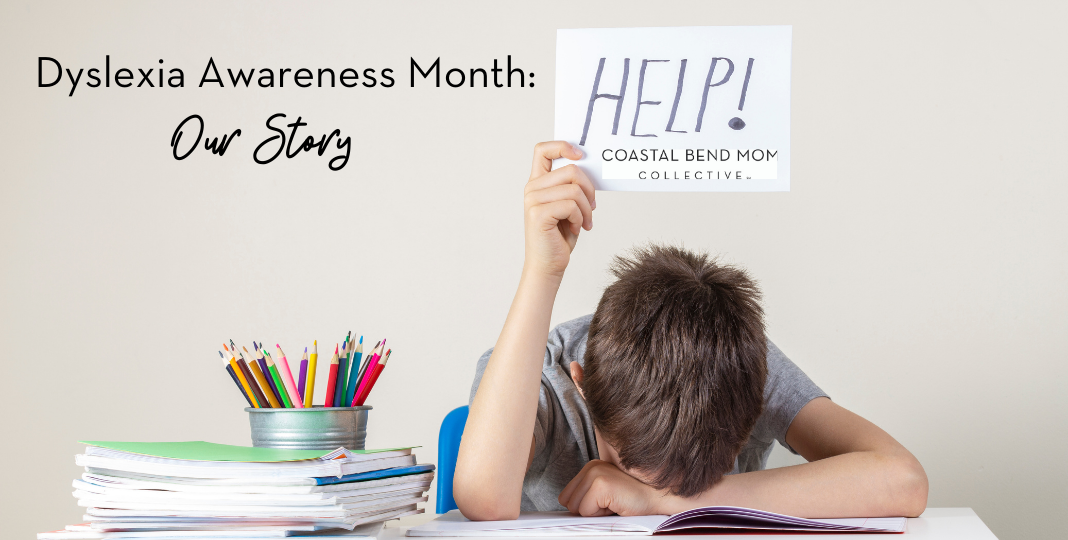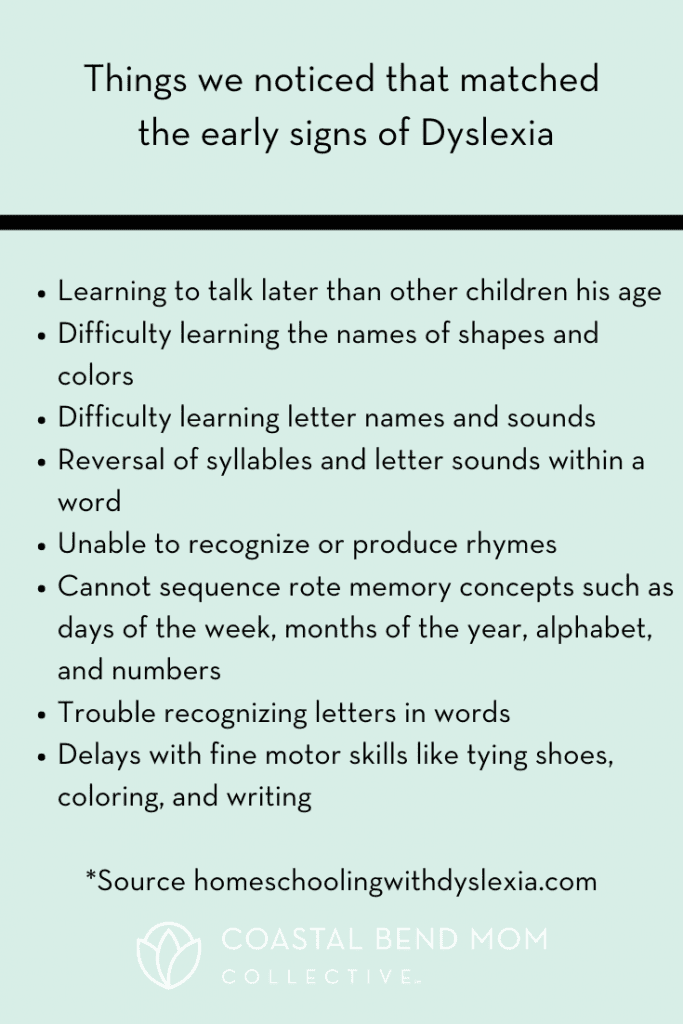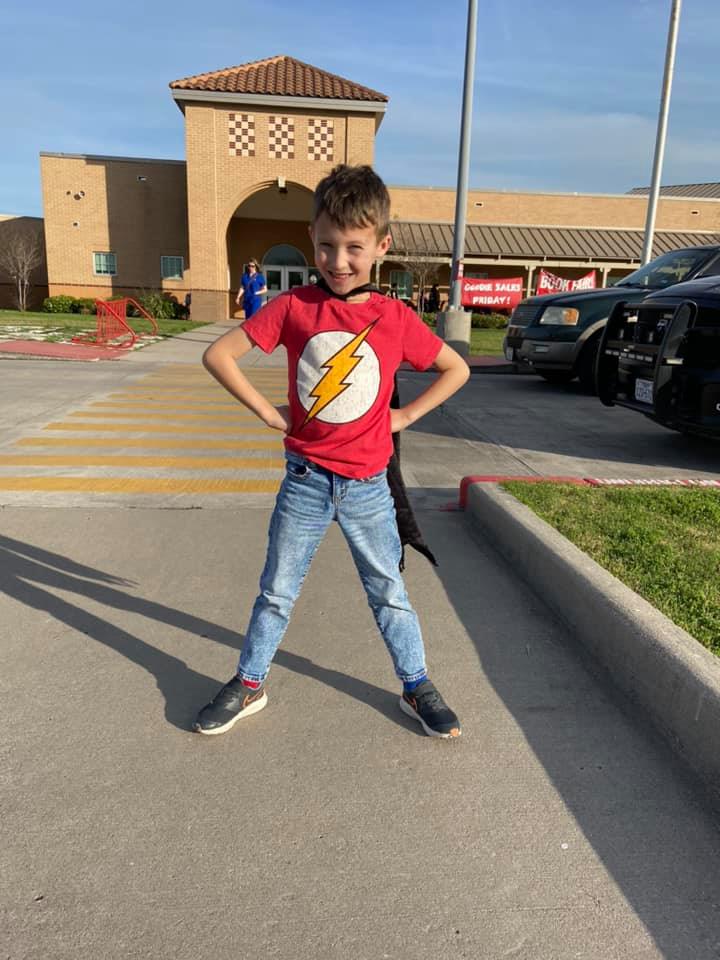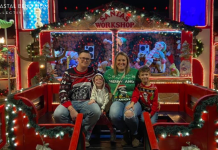October is Dyslexia Awareness Month!

This year it means a little more to our family. Our son was officially identified as dyslexic and having dysgraphia which then qualified him for extra support and services at school. I wanted to take the opportunity of our first Dyslexia Awareness Month to share a bit of our story with you and share some resources that will help if you suspect that you have a child (or adult) that may be struggling with dyslexia.

Our Story:
Our story starts when my son started kindergarten in 2018. He had attended a preschool program but it was more daycare than academic. While they had a curriculum I was not really regularly updated with progress or anything like that. He is our oldest so we really did not know what to expect when he went into Kindergarten. We had taught him how to write and spell his first name (with tons of repetition), he could mostly sing the alphabet song, so we thought he was where he needed to be. Boy, we were WRONG!
Around October of that year, we were called in for our first parent-teacher meeting and got blindsided by the news that he was significantly behind his classmates in all things reading and in his number recognition. I vividly remember leaving that meeting in tears and driving straight to Walmart to buy every flashcard they had. I took the list of things he was struggling with, signed up for teachers pay teachers, and began my mission to do everything in my power to make sure he could succeed at school.
We did extra sight word practice and flashcards every day after school, and I did a ton of research. The more I read the more I felt like he was falling in line with every early sign of Dyslexia. I found list after list of common signs among young children and more often than not I could check off every single thing on the list.

I took it upon myself to reach out to his teacher and the campus dyslexia teacher to see what the process was to confirm my suspicions and to get their opinions on everything that I was seeing at home. It was then that I learned that they would not even explore this until the second half of first grade and I was told just to keep working with him.
Admittedly I was frustrated, but we worked hard and he did improve by the end of the year. He never got to where they wanted him to be but enough that his teachers were happy with the progress and encouraged us to keep up the work. What is frustrating about that is that I had a 5-year old that was doing hours of extra work a week just to keep afloat in class. And he was beginning to HATE school. He got frustrated to the point of tears every single time he had to read, and he did not enjoy anything about school (except recess and lunch and seeing his friends). I had that momma intuition that there was more to this, but was constrained by the procedures, and I didn’t know where to turn privately to get any answers.
At the start of the next year, we did not waste any time, at his meet the teacher I told his new teacher of all the struggles from the previous year, my suspicions, and that we had started the process to have a speech evaluation at the end of the previous school year. It took another 3-4 months to get his evaluation done and to get a meeting about the results. However, the speech teacher didn’t feel that he qualified for any services.

To be honest, we were devastated and at a loss, even his teacher was confused. But it seemed like to them he wasn’t struggling enough, but what I don’t think they took into account was that we were still working for hours extra every week just to keep him afloat.
Finally, the Spring of 2020 came and it was time for the initial dyslexia screening for first graders and he was in the group! The process is that they do an initial evaluation, those that show signs of possible dyslexia are then submitted for a full evaluation. And to our delight, he was submitted for the full evaluation. Unfortunately due to COVID all of the evaluations got delayed until the Fall of 2020.
He is now in Second grade, reading is a giant chore and usually ends with one or both of us in tears. But there is finally a light at the end of the tunnel! As of September 9th, 2020 he QUALIFIED FOR SERVICES!!!!
He was identified as dyslexic and having dysgraphia.
Dyslexia- a general term for disorders that involve difficulty in learning to read or interpret words, letters, and other symbols, but that do not affect general intelligence.
Dysgraphia can appear as difficulties with spelling and/or trouble putting thoughts on paper. Dysgraphia is a neurological disorder that generally appears when children are first learning to write.
He is now receiving specialized instruction every day at school along with his regular studies and has a 504 Plan in place to make sure that he can learn skills to overcome the hardships that come along with dyslexia. In the very short time that he has had this extra support at school it is like he is a different kid. He no longer begs each day to not have to go to school, he is more confident and is proud of the grades he is making.
I know this was a long story and it is honestly so mild compared to the stories of others I have heard in their quest to get a diagnosis and support. If you have made it this far, I thank you! I wanted to tell our story as an encouragement for those who feel like they are not being listened to. If you feel something strongly I want to encourage you to keep pushing. Keep emailing, keep advocating, and teach your child to advocate for themselves. Long before we were receiving the help we made sure that our son knew to raise his hand and tell his teachers when he was struggling. At one of our parent-teacher meetings last year his teacher mentioned that he was doing a great job of advocating for himself and making sure she knew he needed help.
He is such a happy and smart kid and it broke my momma heart to see him struggle so much for the first two years of his educational career. I am so grateful for the friends and teachers and family members that supported our journey and gave us help and advice for helping him. We have a long road and this is something that he will carry with him forever. But to him dyslexia is not a bad thing, it just means that he sees things and looks at things differently than other people. As a family we are taking up this cause to make sure that everyone gets the same opportunities to get help, and to show the world that Dyslexia is not a bad thing, it is our son’s superpower! Statistics show that 1 out of 5 students have dyslexia, and not all of them get the help they need. Many are categorized as lazy or not intelligent and struggle to get through school.

Dyslexia Resources:
If you are reading our story and it sounds so familiar, or you feel like you have a child that is showing signs of dyslexia I wanted to share some resources that I have found that have really helped me. It is hard if you do not have the same struggles to know exactly what to do to help your child.
Websites:
Homeschooling With Dyslexia – “Kids with dyslexia learn differently and therefore need to be taught differently. I’ll show you how! My mission is to provide reliable, research-based, and highly useful information to families and teachers of kids with dyslexia.”
International Dyslexia Association – provides so many resources and information for families.
Books:
Teaching A Struggling Reader: One Mom’s Experience with Dyslexia
Blueprint for a Literate Nation How You Can Help
The Math Handbook for Students with Math Difficulties, Dyscalculia, Dyslexia or ADHD: (Grades 1-7)
The Dyslexia Empowerment Plan: A Blueprint for Renewing Your Child’s Confidence and Love of Learning
Once Upon An Accommodation: A Book About Learning Disabilities
Podcasts:
The Dyslexia Quest podcastElisheva Schwartz
Dyslexia Is Our Superpower PodcastGibby Booth Jasper
Dyslexia ExploredDarius Namdaran
Smart Child Bad Grades? Liz Weaver
Dyslexia Coffee TalkThe Dyslexia Initiative
I really hope that sharing our story and sharing the resources that I have found most helpful helps even one mom out there that feels like she isn’t being listened to. Or help the mom that just doesn’t know what to do to help your child and feels overwhelmed by all the resources on the internet. We are still at the beginning of this journey and do not have it all figured out, if you are a veteran dyslexia mom please share with us what resources you have found and used.














